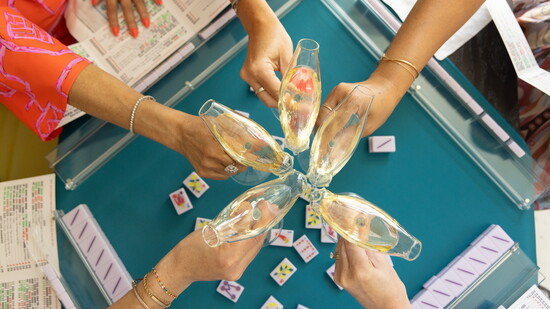Two years ago, what started as a casual curiosity about a centuries-old Chinese game blossomed into one of Tulsa’s most vibrant and welcoming communities. Today, The Mahjong Social Club isn’t just teaching people how to play—it’s building bridges, sparking friendships, and proving that Mahjong is so much more than a game.
At the heart of this movement are Courtney Wilson and Heather Duncan, two longtime friends and civic-minded women whose bond began nearly 15 years ago while serving together on the board of the Junior League of Tulsa. Though their kids never shared a classroom and life often pulled them in different directions, the two remained close—living just three blocks apart and constantly collaborating.
Courtney, the club’s founder, was first introduced to Mahjong through a friend in Tulsa. Intrigued by the rapidly growing enthusiasm surrounding the game, she decided to give it a try. “I saw people I admired playing it and loving it,” she recalls. That spark of interest quickly grew into something more. Initially, Courtney hosted themed Mahjong parties, but it didn’t take long to realize the real need was instruction. So she pivoted—and The Mahjong Social Club was born.
As the demand for lessons grew, Courtney turned to Heather. “I love Mahjong, but I love Courtney more,” Heather says, chuckling. She was originally “tricked” into learning the game by three mentors who insisted she join a retreat—but only if she first learned to play. What started as a reluctant introduction turned into a true passion. With a background in nonprofit management and retail, Heather brought organizational savvy and a heart for community. She officially bought into the business in January.
Together, they’ve built more than a club—they’ve created a movement.
For those unfamiliar, Mahjong is an ancient Chinese tile game that combines strategy, memory, and a touch of luck. The version taught by The Mahjong Social Club is the American adaptation, which gained popularity in the U.S. during the 1920s and saw a resurgence during the pandemic. The club offers beginner-friendly lessons, typically lasting about two hours, with a thoughtful 4:1 student-to-teacher ratio to ensure everyone receives personalized guidance. No prior experience is required—just curiosity and a willingness to learn.
But what sets the club apart is what happens after those first lessons.
Open play nights, strategy workshops, private sessions, and a growing six-week league help players sharpen their skills while staying connected. Their multi-day “Camp Mahj” retreat has drawn attendees from across Oklahoma and beyond. The community is diverse and multigenerational—ranging in age from 9 to 92. “Mahjong does not discriminate,” Courtney says. “We’ve seen people reconnect with friends from old chapters of their lives.”
Looking ahead, the vision is expansive. Heather and Courtney see Mahjong as a powerful tool for connection—not just socially, but philanthropically. “It’s fun, mentally engaging, and competitive in the best way,” Heather says. “There’s real potential to use Mahjong events in place of traditional fundraisers.” With her nonprofit background, she sees the game’s potential for deeper impact.
Currently, the club boasts seven trained instructors and has plans to grow. A brand-new website will soon offer easier booking, instructor spotlights, and potentially virtual classes. As brand ambassadors for The Mahjong Line—a company known for its modern, colorful Mahjong sets—Courtney and Heather are adding style and accessibility to a game rooted in rich tradition.
As The Mahjong Social Club celebrates its second anniversary, the energy is electric and the possibilities are endless. “This has happened so organically,” Heather says, “but the scope is truly limitless.”
For anyone curious but intimidated, Courtney offers this piece of advice: “Just come. We’ll teach you everything you need to know.”
“What started as a themed party idea turned into something much bigger. People didn’t just want to play—they wanted to learn. That’s when we knew we had something special.”
